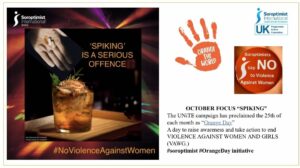On Orange the World Day 25th October 2022 we focus on Spiking. Spiking is on the rise and its victims are overwhelmingly young women/students. Spiking is usually a precursor to violent and sexual crime. The Rape Crisis Centre says “Whatever the motive, spiking is never funny. It can make a person extremely vulnerable and ill, and have a lasting impact on their life and wellbeing. Spiking someone in order to commit a sexual offence against them is a serious crime – no matter whether any sexual offence took place. It carries a maximum sentence of 10 years in prison in England and Wales.”
Drink spiking is when someone puts drugs or alcohol into a person’s drink without their knowledge or consent. It can include putting alcohol into a non-alcoholic drink, adding extra alcohol to an alcoholic drink or slipping prescription or illegal drugs (such as tranquilisers, amphetamines or GHB – liquid ecstasy) into an alcoholic or non alcoholic drink. It can be difficult to tell whether a drink has been spiked, as substances used for spiking usually have no taste, odour or colour.
Needle spiking is where someone surreptitiously injects, with a hypodermic needle (or other form of administration e.g. via combi-pen) a victim with a substance.
There has been a prevalence of drink spiking in recent years, but needle spiking appears to be a new phenomenon in the UK from 2021, peaking in October 2021, coinciding with the start of the university year. Universities are being told to introduce anti-spiking policies by the end of 2022. 81% of recorded victims are students.
Police data show that 93% of needle spiking incidents occur in the evening and night-time economy, most frequently in pubs and clubs; a much smaller number of reported crimes occur at private parties, although some incidents occur at non-regulated events, festivals and house-parties e.g., among students and under-age drinkers where there are no bar staff or education about what is a measure of alcohol, and over-pouring or free pouring happens.
The majority of victims of spiking are females in their early twenties, 88% of needle spiking victims are female and 81% are students, but it occurs in females and males of all ages and can affect victims’ physical, mental and emotional health.
The Home Office has been asked to increase education and awareness about spiking and it is considering whether a specific new offence of spiking is required. The Home office Committee have urged the Home Office to focus its efforts first on improving reporting of the crime of spiking and on gathering information about the reasons for and outcomes of such reports, and have invited the Home Office to set out the steps it will take to improve data on
the scale, prevalence and danger of spiking.
The Home Office has said that its “ Tackling Violence Against Women and Girls (VAWG) Strategy” is committed to a national communications campaign “ with a focus on targeting perpetrators and harmful misogynistic attitudes, educating young people about healthy relationships and ensuring victims can access support”.
For further information on the Home Affairs Committee reports on Spiking see below:
New work with universities:
Other resources:



